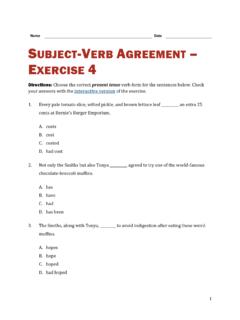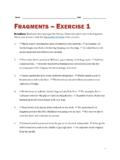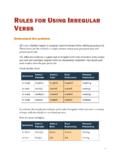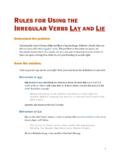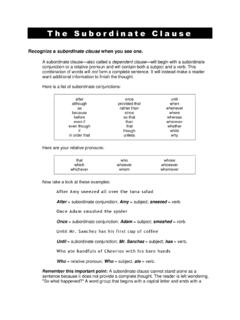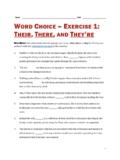Transcription of R FINDING AND F SENTENCE FRAGMENTS
1 1 RULES FOR FINDING AND FIXING SENTENCE FRAGMENTS Recognize the difference between a SENTENCE and a fragment. A fragment resembles a SENTENCE in two ways. Both groups of words begin with a capital letter and conclude with an end mark usually a period [.] but sometimes a question mark [?] or an exclamation point [!]. The one important difference is that a fragment does not contain a main clause. Like an engine, the main clause powers a complete SENTENCE , propelling the reader through the development of an idea. A fragment, missing this essential component, stalls on the page. When you analyze a group of words looking for the main clause, you have to find three things: a subject, a verb, and a complete thought. If one of these three items is missing, a fragment results. Here are examples of FRAGMENTS : A n d y a w n e d l o u d l y e n o u g h t o m a k e e v e r y o n e i n c l a s s t u r n a r o u n d.
2 Subject = ; verb = yawned; complete thought = . T h e b o y s i t t i n g o n t h e f i r e e s c a p e, d r o p p i n g w a t e r b a l l o o n s o n t h e p e d e s t r i a n s b e l o w . Subject = boy; verb = ; complete thought = . A f t e r G a b r i e l a t e h a l f a b o x o f d o n u t s. Subject = Gabriel; verb = ate; complete thought = . 2 Know how to identify the type of fragment that you have found. You can correct a fragment two ways: 1) adding the necessary main clause or 2) connecting the fragment to a main clause already in the passage. Whether you add or connect, you must use the right punctuation. Some FRAGMENTS , for example, will require a comma if you connect them at the beginning of a main clause. If you choose to connect them at the end, however, these same FRAGMENTS require no punctuation at all.
3 Other FRAGMENTS will require a comma whether you connect them at beginning or the end. To make an intelligent comma decision, you first have to identify the type of fragment that you have. A fragment will often be a lone subordinate clause, participle phrase, infinitive phrase, afterthought, lonely verb phrase, or appositive. Each type of fragment has a marker that identifies it. SU B O R D I N A TE CL A U S E FR A G M E N T S A subordinate clause fragment [sometimes called a dependent clause fragment] will begin with a subordinate conjunction, a relative pronoun, or a relative adverb. You will also find a subject and a verb. Unfortunately, this combination of words will not express a complete thought by itself. Think of the problem like this: At work, there are bosses and their employees, also known as subordinates.
4 When the bosses aren't directly supervising, many subordinates neglect their responsibilities. In a SENTENCE , the main clause is the boss. If the boss is absent, the subordinate clause goofs off, and the job of communicating a full thought doesn't get done. Here are the words that will begin a subordinate clause fragment: SU B O R D I N A T E CO N J U N C T I O N S after although as as if as long as as soon as as though because before in case in that in order that in so far as just as no matter how now that once provided that than that though till unless until when whenever where 3 even if even though how if rather than since so [that implied] so that whereas wherever whether while RE L A T I V E PR O N O U N S that what whatever which whichever who whoever whom whomever whose whosever RE L A T I V E AD V E R B S when where why These words are your markers for this type of fragment.
5 Here are some examples: B e c a u s e C h a s e c a u g h t t h e e y e o f t h e b e a u t i f u l b r u n e t t e i n a l g e b r a . Because = subordinate conjunction; Chase = subject; caught = verb. What happened? Was he able to cheat on the test? Did he quickly ask her for a date? We don't know because the thought is incomplete. U n t i l R a c h e l n o t i c e s t h e t o i l e t p a p e r s t u c k t o h e r s h o e . Until = subordinate conjunction; Rachel = subject; notices = verb. What will happen? Will she embarrass her date? Will people at the restaurant stare? We don't know because this is another incomplete thought. E v e n t h o u g h F r e d s t u c k s t r a w s u p h i s n o s e . Even though = subordinate conjunction; Fred = subject; stuck = verb.
6 What happened? Could he still not pass for a walrus? Did the McDonald's manager offer him a job anyway? We don't know because this thought is incomplete too! 4 Whom y o u c a n t r u s t w i t h t h e s e c r e t . Whom = relative pronoun; you = subject; can trust = verb. Who is this person? We don t know because this thought is not finished. W h e r e t h e p o p c o r n i s s t a l e a n d t h e s o d a f l a t . Where = relative adverb; popcorn = subject; is = verb. This sounds like a place to avoid, but where is it? We don t have enough information to know because we have only half the thought. PA R T I C I P L E PH R A S E FR A G M E N T S A participle phrase fragment will begin with a word ending in ing or ed, or the fragment will open with an irregular past participle.
7 More words will follow to finish the phrase, but nowhere will you find a main clause to complete the thought. By itself, a participle phrase cannot be a SENTENCE . Your marker for this type of fragment is the present or past participle that you will find at the beginning of the fragment. Take a look at these examples: S u n n i n g t h e m s e l v e s o n t h e h o t c o n c r e t e u n t i l t h e y h e a r d h u m a n f e e t c r a s h i n g d o w n t h e s i d e w a l k . A l l t h e w h i l e t w i r l i n g t h e b a t o n w i t h t h e s p e e d a n d f e r o c i t y o f h e l i c o p t e r b l a d e s . S u c k e d d o w n t h e p i p e w i t h a h e a r t y s l u r p . H i d d e n i n t h e b u r e a u d r a w e r u n d e r n e a t h a p i l e o f m i s m a t c h e d s o c k s.
8 IN F I N I T I V E PH R A S E FR A G M E N T S An infinitive phrase fragment will begin with to followed by the base form of the verb, like this: TO + VE R B = infinitive. 5 Although more words will follow to finish the phrase, you will not find a main clause to complete the thought. An infinitive phrase by itself cannot be a SENTENCE . Look for the to + verb as your marker for this type of fragment. Study these examples: O n l y t o w a t c h i n d i s m a y a s D r . F r a z i e r p o u r e d h e r c h e m i s t r y e x p e r i m e n t i n t o t h e s i n k . T o c a t c h b u t t e r f l i e s f o r h e r b i o l o g y p r o j e c t . T o b r e a k a p i e c e o f p l y w o o d w i t h h i s b a r e h a n d s . AF T E R T H O U G H T FR A G M E N T S An afterthought clarifies earlier information by providing specific details.
9 When an afterthought does not contain a main clause, it is a fragment. These words and phrases frequently begin afterthoughts: especially, except, excluding, for example, for instance, including, like, and such as. These words are your markers for this type of fragment [although infrequently you will have just the list of details]. Here are some examples: F o r e x a m p l e, l e a k y p e n s , c a n d y w r a p p e r s , d o l l a r b i l l s , a n d p a p e r c l i p s . I n c l u d i n g t h e d o g w i t h t h r e e l e g s a n d t h e c a t w i t h o n e e y e . S u c h a s l e a v i n g t h e s t o v e o n a n d t e a s i n g m e a n d o g s . LO N E L Y VE R B FR A G M E N T S Writers will sometimes forget to include a subject in a SENTENCE .
10 The result is a verb pining for its partner. With the subject missing, the word group thus becomes a lonely verb fragment. A lonely verb fragment will often begin with a coordinating conjunction [and, but, for, or, nor, so, yet]. The marker for this type of fragment will be the immediate expression of action. Remember that a verb alone cannot be a SENTENCE . 6 Study these examples: A n d d a s h e d t h r o u g h t h e d o w n p o u r a s r a i n d r o p s s o f t e n e d t h e h a i r s p r a y s h e l l h o l d i n g h e r e l a b o r a t e c o i f i n p l a c e . B u t k n e w t h a t a l l o f h i s e f f o r t w o u l d p r o v e u s e l e s s i n t h e l o n g r u n . T o o k t h e t h i c k b o o k a n d , w i t h a h e a v y s i g h , l o a d e d i t o n t o p o f h e r r e s e a r c h p i l e.
